China's route to riches
- Published
- comments
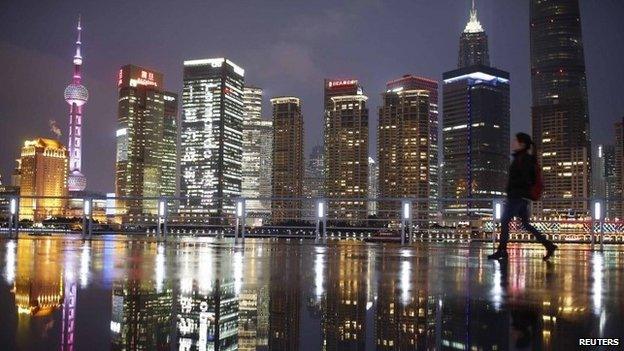
A high proportion of China's millionaires live in Shanghai
This is the billion dollar question. How did a poor communist country transform itself into having the second most billionaires in the world, after the United States, in just over a generation?
Hurun, which tracks the wealthy, external, says that they have identified 400 billionaires in China, but there are another 800 yet to be profiled.
I went to Shanghai to find out, since it's one of the cities where the rich dwell. Hurun estimates that one in seven millionaires in China live in Shanghai. One in six live in Beijing.
It's an extraordinary change from a centrally planned economy where everyone was at least nominally equal. But, like in George Orwell's Animal Farm, some animals are more equal than others. Rich officials and their offspring, the princelings, have always sat uncomfortably within a communist system.
Indeed, communism erased inherited wealth in China.
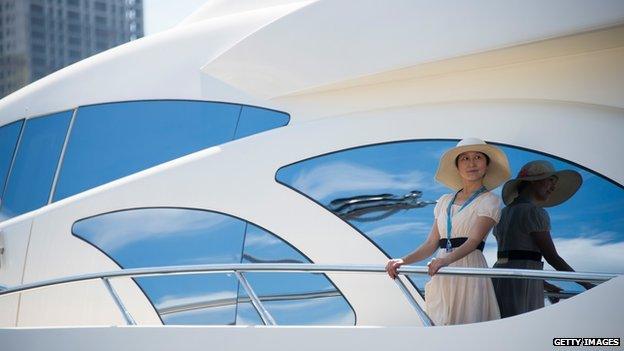
The super rich in China are beginning to spend their wealth like those in the West
Hurun estimates that more than half (55%) of millionaires started their own businesses. Of the rest, 10% made their fortunes from the stock market, 15% from real estate, and 20% are highly paid executives
Of the super rich - those with 100m yuan ($16m; £10m) or more - the number of entrepreneurs stands out even more. Some 80% of the super rich own their own firms and 15% made their money from real estate, while another 5% made a fortune in stocks.
Slow privatisation
To put this in context, the self-employed make up only about 6% of the Chinese workforce. That's below the 16% average for OECD developed countries, and much lower than in developing countries such as India, where it's 82%.
The reason is because the market was only opened up to private enterprises in the past two decades when private firms were legally recognised and private contracts honoured after the dramatic downsizing of the state-owned firms that have dominated since 1949. And those who took the plunge early on to start their own firms, such as Wang Jianlin, whom I have written about before, are among the richest people in China.
Now, as China tries to shift towards more innovation, its Premier Li Keqiang has been encouraging "grassroots entrepreneurship". The latest figures show that self-employment rose by 45% in a year to reach 52 million out of 937 million in the working age population in 2012. But it's still fewer than the 66 million employed in state-owned enterprises.
'Hacker spirit'
But when China puts its mind to something, it goes big. There are 49 tech firms that start up every day in China's Silicon Valley, external.
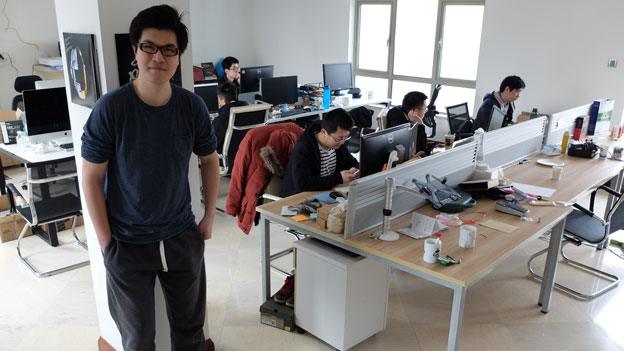
Tech entrepreneur Thomas Yao employs 40 people
I met one of those tech entrepreneurs, Thomas Yao, who runs GitCafe, a software hosting service and IT consultancy, and of course asked him about the Great Firewall in China, which blocks a number of international websites, including Facebook, Twitter and Google.
He says that the ability to work around the Great Firewall is a "must have" skill.
I went to see Thomas in his luxury villa in a suburb of Shanghai that doubles as the office for himself and his 40 employees. Soda cans and video games are strewn around the living room that is also their main working area. He says the Silicon Valley vibe is what they aim for.
In fact, when I met him at 10am, there was no-one else there, since it was a touch early for the young programmers who usually start at 11am or midday and work late.
Instead of going to college, he decided to become an entrepreneur. When I asked him why, he replied that it was "all about the hacker spirit… [I'm] not really interested in making money, getting really rich. I'm really interested in solving problems like education."
I was curious about how a country known for its censorship could foster so many tech start-ups like his. "China will open up more and more... since there is no way to do more censorship," he said.
He added that for tech start-ups, it was "quite painful" to talk about politics. "You just don't mess with government if you don't have to."
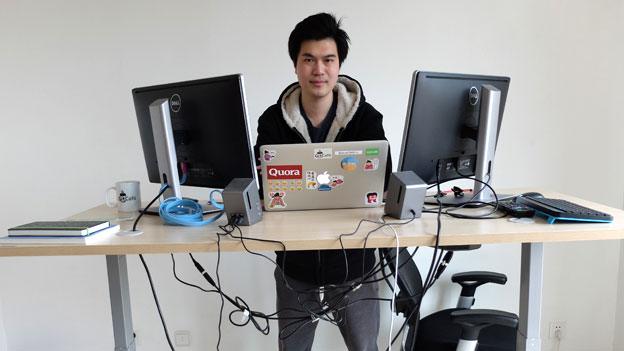
Thomas Yao says he is not interested in making money but wants to help solve problems in society
New wealth
When a start-up goes public, that's usually when it makes its founder and employees rich. Shirley Yeung, who founded venture capital firm Dragonrise, says that is the source of the recent growth of the super rich in China.
She was one of the first investors in Tencent, the largest listed tech company in Asia, founded by billionaire Pony Ma. Since going public in 2004, the company behind the popular app WeChat has made Pony Ma the third richest man in China, after only Wanda's Wang Jianlin and Alibaba's Jack Ma.
Shirley says that the early employees of companies such as Tencent and Alibaba are among the new class of the wealthy and are starting their own businesses and ventures.
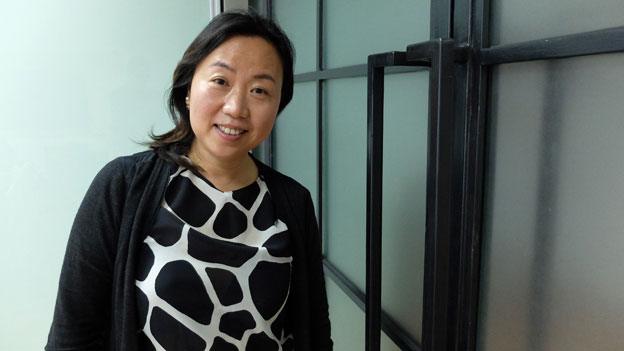
Shirley Yeung says start-ups going public is behind the recent growth of the super rich in China
They're not the only ones. The earlier generation who made their money in property like Wang Jianlin, China's richest property tycoon, are still running their empires. His son, Wang Sicong, is one of the fuerdai, the rich second generation, who is also running his own company funded by his parents' wealth.
The coming of age of the second generation adds to the number of wealthy in China. Their parents made their fortunes when China liberalised its consumer markets during the 1990s and are still going strong. The 2000s saw tech entrepreneurs make dollops of cash from initial public offerings (IPOs) which have spawned more millionaires.
Flying first class
Taken together, the super rich in China now look more like the wealthy in other places - a combination of entrepreneurs and inherited wealth.
Shirley Yeung says that they are also beginning to spend like those in the West. She says that of the multi-millionaires she knows, the majority are very frugal. In the first couple of years when they first accumulated wealth, they would fly economy class to the US. But they don't do that any more, she says. "They fly first class now."
When I asked her what was the most extravagant thing she had seen, she replied that the rich in China are now flying to Switzerland for La Prairie clinics because "they want to live longer".
It's only a matter of time before more of China's wealth is seen around the world. And that is just as well because with concerns about the prospects for long-term growth in the big Western economies, we all need the great new Chinese consumer class to keep spending.

For more, listen to Six Routes to Riches on Saturday, 14 March on BBC World Service and Marketplace in the US, or watch Talking Business with Linda Yueh.